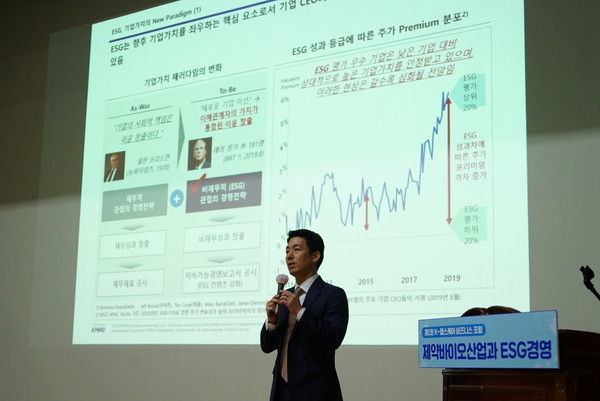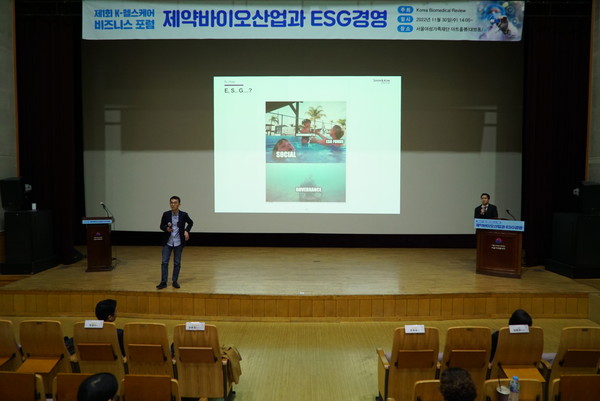‘EGS is key for Korean drugmakers to be successful in global market’
Healthcare experts and industry leaders emphasized the importance of ESG (Environmental, social, governance) management in the pharmaceutical and biotech industry at a forum hosted by Korea Biomedical Review (KBR) in Seoul on Wednesday.
KBR, a sister paper of Korean Doctors’ Weekly, launched the K-Healthcare Business where ESG was chosen as the first theme of the event.
Over 100 industry officials from over 40 domestic drugmakers and Korean offshoots of multinational pharmaceutical firms participated in the forum. In addition, some doctors from one of the top five hospitals who showed keen interest in ESG in healthcare attended the event.
The forum consisted of ESG lectures by four speakers – Jang Yoon-jae, head of ESG research at Shin & Kim, Park Kyung-soo, partner at KPMG Samjeong Accounting, Lee Hee-seung, external affairs executive director at MSD Korea, and Kim Tae-woo, executive director at MSCI Korea.
Park Kyung-soo, partner at KPMG Samjeong Accounting, speaks on ESG management in the healthcare industry during the first K-Hhealthcare Business Forum in Seoul, Wednesday.
Park from KPMG, head of consulting for healthcare companies and hospitals, emphasized that ESG was pivotal for domestic pharmaceutical firms to enter the global market successfully.
Even though the Korean government is actively supporting local drugmakers and biotech firms to tap the foreign markets, such healthcare companies will face tougher ESG-related regulations in the EU and the U.S. going forward, he said.
“In terms of complying with the global regulations and seeking active collaborations with foreign companies, if domestic pharmaceutical companies turn a blind eye to ESG, it could play as a risk and a missed opportunity,” Park said.
He went on to say that credit rating agencies started to integrate ESG performance in credit analysis – raising the rating for those with good ESG performance and lowering the rating for those not caring for ESG.
A higher rating means cheaper rates for borrowing money for companies and this could be crucial in the current high-interest rate era, he noted.
Jang Yoon-jae (right), head of ESG research at Shin & Kim, emphasizes the importance of G in ESG.
Jang at Shin & Kim, a law firm, said among the separate E, S, and G parts, E was receiving excessive attention and G, too little attention.
“Although people pay attention to E and S a lot, G provides the fundamental base for all ESG activities,” Jang said.
He took an example of a company trying to change its business portfolio to an environment-friendly one. In this case, there should be a board of directors or management executives who could speak out for eco-friendly business for the company, he said.
“Governance can be said in three things – first, a management system that makes corporate management work well. Second, a mechanism that coordinates the interests of stakeholders inside and outside the company, and third, a mechanism that allows a return of investment to investors well,” Jang said.
Lee of MSD Korea introduced MSD’s ESG efforts, achievements, and strategies as a global pharmaceutical company.
One of the MSD’s goals to improve healthcare access is to provide the company’s medicines to over 75 percent of the world every year, she noted. In 2021, MSD supplied drugs to 79 percent of the world, she said.
To improve access to innovative drugs, in particular, MSD Korea was putting every effort to collaborate with Korean scientists and physicians, she noted.
MSD is conducting clinical trials worldwide and among the top 10 clinical centers in terms of the number of trials, four are located in Korea, according to Lee.
Kim of MSCI Korea explained MSCI’s ESG rating methodology and issuer trends.
He cited an MSCI ESG Research study, saying that companies with high ESG ratings had higher profitability based on 10 years of data.
He also emphasized that not only mandatory public filings but voluntary ESG reports and alternative data provided by outside sources were significant inputs to MSCI’s ESG rating model.
No Byline Policy
Editorial Guidelines
Corrections Policy
Source

